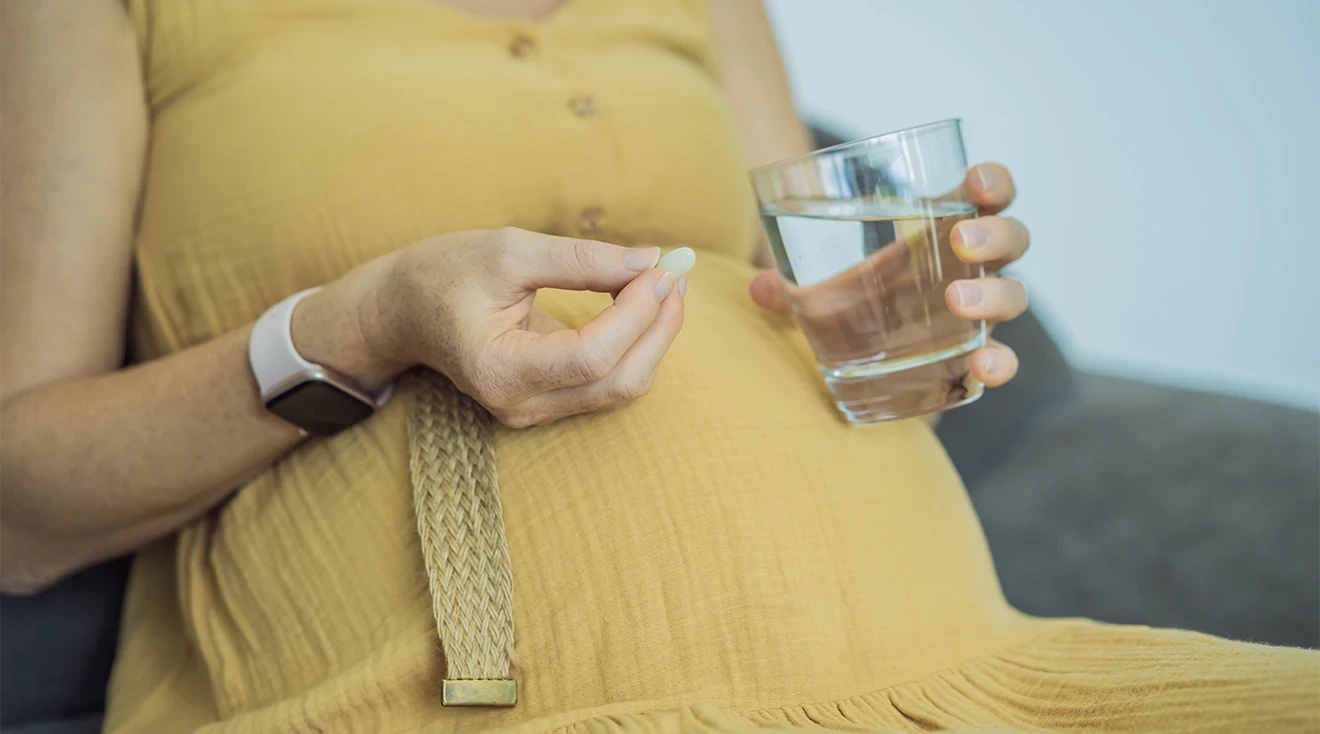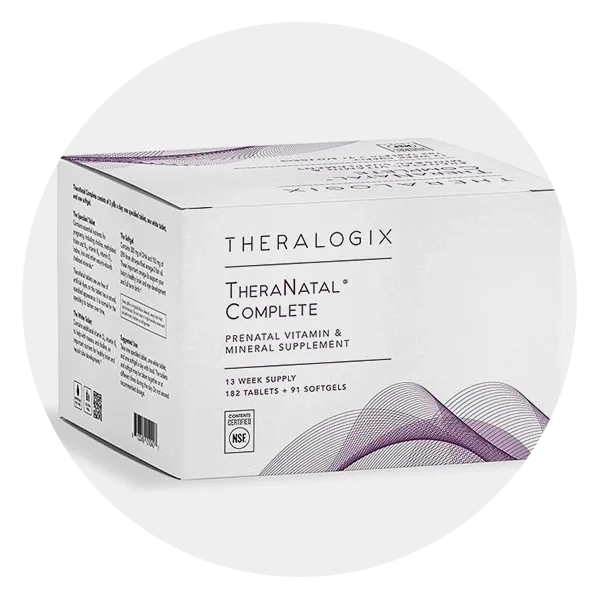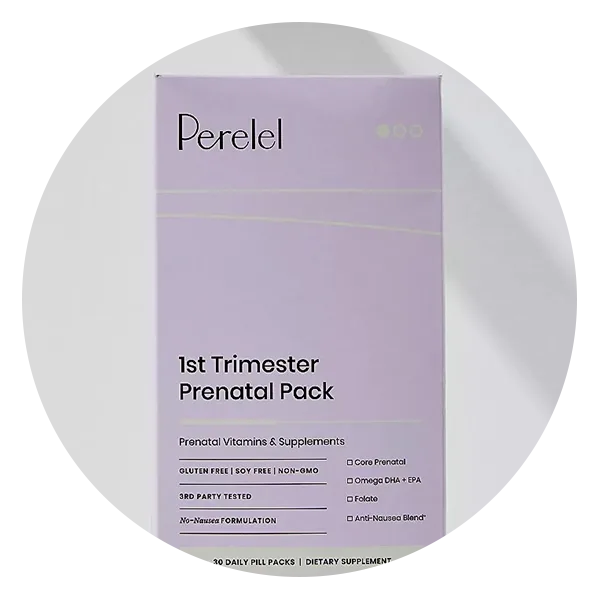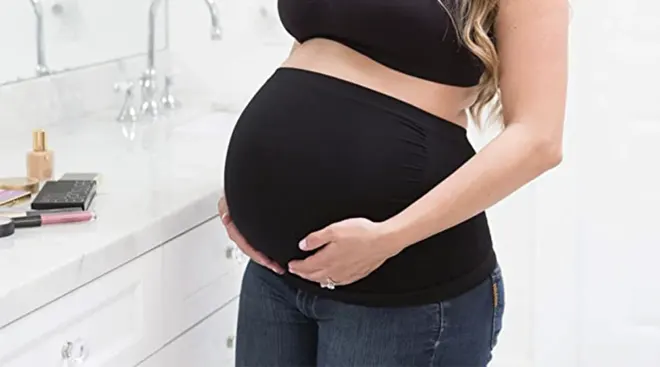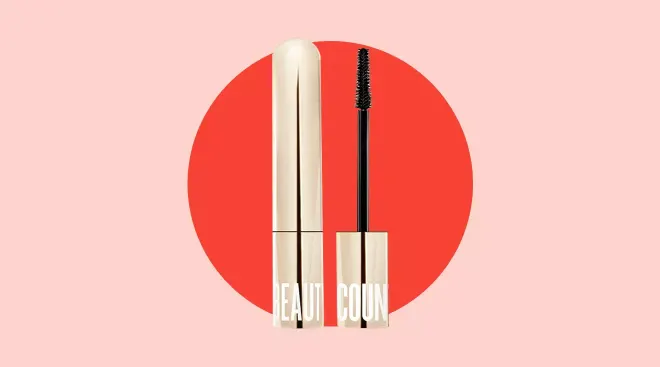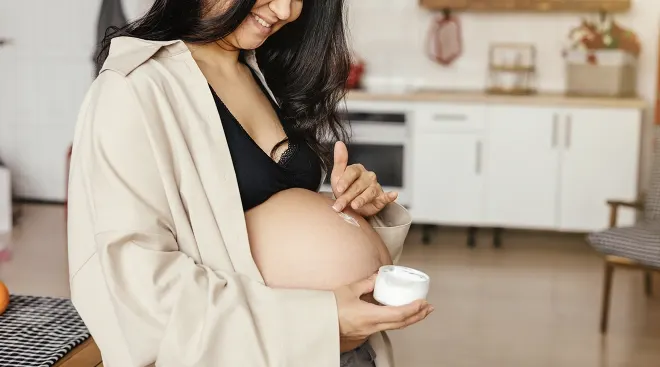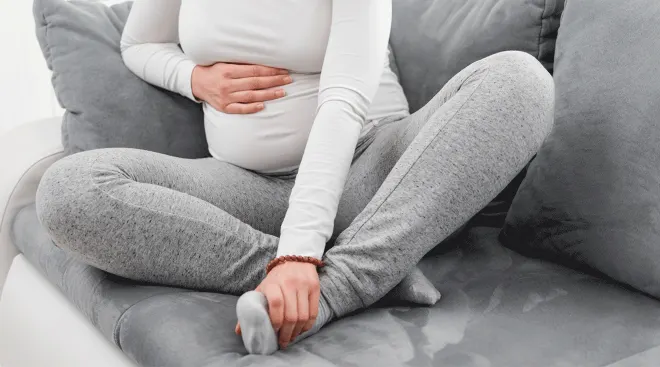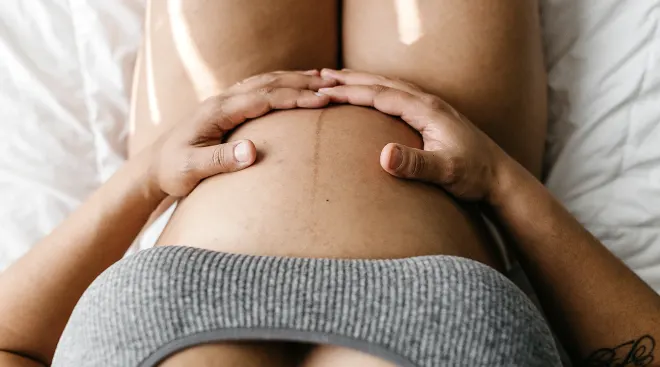The Best Prenatal Vitamins, Tested by a Mom-to-Be
In a nutshell:
Based on feedback from medical experts, a survey of 200 members of The Bump community and the author’s product testing, we chose TheraNatal Complete Prenatal as the overall best prenatal vitamin due to its comprehensive ingredient list and robust standards for effectiveness and safety.
As soon as you get that positive pregnancy test, chances are you’ll start the hunt for a prenatal vitamin—that is, if you aren’t taking one already. After all, prenatal vitamins are crucial to baby’s health, and yours too, to help make sure you’re getting all the vitamins and minerals that are recommended for a healthy pregnancy. “Daily prenatal vitamins supplement a balanced and nutritious diet as your body evolves during pregnancy to accommodate a growing fetus,” says Irogue Igbinosa, MD, a board-certified ob-gyn and a maternal-fetal medicine physician at Stanford Medicine Children’s Health.
Below, discover our favorite prenatal multivitamin options for an array of lifestyles and needs, plus expert-backed advice and answers to a series of commonly asked questions.
We did extensive research to create a shortlist of 13 top-rated prenatal vitamins to test, and from there took the following steps:
- As an expectant mother in her third trimester of pregnancy (at the time of publication), I tested the prenatal vitamins throughout my first, second and third trimesters. Along with robust research and expert insight, I evaluated the ingredients list, ease of use, taste, side effects, dosage, value for money and overall quality of the vitamins.
- We consulted four ob-gyns, a certified nurse midwife and a prenatal nutritionist to understand essential nutritional factors and safety considerations to keep top of mind.
- We followed nutritional recommendations from the American College of Obstetricians and Gynecologists (ACOG), the Mayo Clinic and the US Centers for Disease Control and Prevention (CDC).
- We reached out to The Bump community and surveyed almost 200 people who were either currently expecting or had recently given birth and asked for their recommendations and experiences with specific prenatal multivitamins.
- Because no two pregnancies are the same, we scoured forums and message boards and read user reviews to find out how these prenatal vitamins performed for expectant moms across the country.
Editorial integrity is at the heart of everything we publish. Read about how The Bump develops and reviews all articles, including product reviews.
Overall best prenatal vitamin
- 25 essential nutrients in only three pills
- Helps with nausea
- Third-party tested
- FSA/HSA reimbursable
- Iron may cause digestive upset
- Not vegan
TheraNatal is founded by a team of physicians and scientists. Its prenatal offering, TheraNatal Complete Prenatal, is our top prenatal pick for the duration of pregnancy because it checks off so many boxes. Out of all the prenatals vitamins I tested, it scored the highest in its ingredient makeup, covering all of the recommended vitamins and minerals for a healthy pregnancy. That list includes methylfolate (5-MTHF), an alternative form of folate that may be easier to absorb.
If you’re looking for a vegan prenatal, this one’s not for you, but the contaminant-free fish oil is a big win for me—it’s made from sustainably-caught Alaska pollock, an affordable and low-mercury choice that's International Fish Oil Standards-certified. (And if you're worried about fishy flavor, I found that this vitamin had no notable flavor, smell or aftertaste—great for moms who may be a bit scent-sensitive during pregnancy.) While the added B6 in this prenatal vitamin can be helpful in reducing nausea, the type of iron used (ferrous fumarate) can cause digestive upset in some, although I’m happy to report that I didn't experience any side effects during testing.
Personally, I like that this multivitamin is pre-packaged in daily doses—everything baby and I need is in three pills. I didn't worry about sorting vitamins or forgetting what to take, even with pregnancy brain fog. To top it all off, TheraNatal Complete Prenatal is tested and certified by the National Sanitation Foundation (NSF), which means the amounts listed on the label are accurate and there are no harmful contaminants. All in all, this is a prenatal vitamin you can trust with your health and baby’s.
Number of servings: 91 | Serving size: 3 pills | Key ingredients: 5-MTHF, choline, vitamin A, all vitamin B variations, vitamin C, vitamin D, vitamin E, vitamin K, calcium, iodine, magnesium, iron, DHA, EPA
Our product tester says:
“I love that this vitamin is so comprehensive, yet I only need to swallow three pills. Plus, the NSF certification and the research that went into developing this prenatal gives me peace of mind.”
Best budget-friendly prenatal vitamins
- Affordable, can be purchased in bulk
- Diverse range of nutrients in a single pill
- Third-party tested
- No choline
- May taste or smell fishy to some
I’ve been taking these soft-gel capsules from NatureMade since before I was pregnant—the combination of the price tag and the quality of the vitamin was a no-brainer for me: You can get these vitamins in bulk for a price that works out to less than 16 cents a day. That's a steal for a prenatal that covers almost all the essentials: folic acid, omega fatty acids, calcium, iron, magnesium, vitamin E, vitamin B12 and vitamin D3—key nutrients to look for when choosing prenatal vitamins, says Sara Twogood, MD, a board-certified ob-gyn in Los Angeles and co-founder of Female Health Education.
The one strike against this vitamin is that it lacks choline, a vitamin that recent research indicates may be just as important for fetal neurodevelopment as folate, says Lucy Chapin, a certified nurse midwife and founder of Mad River Birth and Wellness. Eggs are the best natural source of choline, so if you’re vegan (or just don’t like eggs), it’s even more essential in a supplement.
Twenty-four percent of our survey respondents used this prenatal multivitamin during their pregnancies. Between the softgel design and the fact that you only need to take one pill a day, the mom-to-bes we spoke to praised this prenatal as easy to swallow—both in size and cost. While some respondents reported a fishy smell or taste, I haven’t had the same experience after seven months of taking it.
Number of servings: 60 to 150 | Serving size: 1 capsule | Key ingredients: Folic acid, all vitamin B variations, vitamin A, vitamin C, vitamin D, calcium, iodine, magnesium, zinc, DHA, EPA
Our product tester says:
“They offer a good range of vitamins and are of good quality.”
Our community says:
"I love that they have everything I need in a prenatal, but they’re also affordable and easy to find at stores." – Meredith, mom of two and The Bump survey respondent
"This is a good range of ingredients in doses that suit my needs. The pills were not too large and easy to swallow." – Amanda, expectant mom and The Bump survey respondent
Best trimester-specific prenatal vitamins
- No-nausea formulation
- Subscription options available
- Vegan-friendly and gluten-free
- Expert recommended
- Requires taking 5 pills daily
- 18 to 22% of the recommended daily choline level
- High price point
- Low in iron
Nutritional needs can change throughout pregnancy to match your baby's development, so some prenatal vitamins are designed to be trimester-specific, sold in three separate formulations to meet the specific needs of each stage of pregnancy. I like Perelel 1st, 2nd and 3rd Trimester Packs because they’re developed by obstetricians and maternal-fetal medicine doctors, and come highly recommended by Chapin. “I really love Perelel,” she told us. “They have been so thoughtful and evidenced-based with their ingredients. Their trimester-specific nutrients have adequate amounts of thyroid-supporting nutrients (which can be taxed during pregnancy) and also consider things like anti-nausea.”
The first-trimester pack includes an additional folate capsule to support neural development, and a B6 and ginger capsule to help ease nausea and morning sickness. Meanwhile, the second-trimester pack comes with calcium and magnesium capsules to ease muscle cramps and build strong teeth and bones in your growing baby. Then, as you near the end of your pregnancy, opt for the third-trimester pack which includes a probiotic for gut health.
I only wish that this prenatal increased in iron as the trimesters progress, which might counteract my own declining blood iron levels. But, unfortunately, it only contains 15 milligrams throughout all three packs. That said, it’s formulated with ferrous bisglycinate, the gentle form of iron, so I didn't have any side effects. I also appreciate that this product has undergone third-party testing and that it’s formulated with high-quality ingredients, like wild-caught anchovies and sardines for DHA and EPA. While the prenatal left me with burps reminiscent of vanilla protein powder, I’d opt for that over fishy burps any day. Plus, switching to nighttime dosing prevented me from knowingly burping.
Number of servings: 30 | Serving size: 5 capsules | Key ingredients: All vitamin B variations, vitamin A, vitamin C, vitamin D, choline, calcium, iodine, magnesium, zinc, DHA
Our product tester says:
“While there are a lot of pills to take, the daily packets make dosing easy. The container keeps them organized and the packaging is eco-friendly.”
Our community says:
"I like the range of vitamins, and the quality of the ingredients." – Cassandra, mom of one and The Bump survey respondent
"I like the range and sourcing of the ingredients." – Hannah, expectant mom and The Bump survey respondent
Best vegan prenatal vitamin
- Third-party tested
- Vegan-friendly and gluten free
- No off-putting taste, smell or burps
- 100% of the recommended daily iron level, in gentle form
- Requires taking 5 pills daily
- High price point
Searching for the best vegan prenatal vitamins? You can’t go wrong with Natalist Women's Prenatal Daily Packs. They beat the trendy vegan prenatals advertised to me on social media because they offer the most comprehensive range of essential vitamins and minerals. This is especially important to those on a plant-based diet since dietary sources of vitamins like DHA (found in fish) and choline (found in eggs) are harder to come by. Plus, thanks to their delayed release design, the vitamins are easy to digest and absorb.
I loved that there was none of the strong algae taste that you can sometimes get from vegan DHA sources. Sure, the vitamin doesn’t include B6 for nausea, but it does include the recommended 27 milligrams of a gentle form of iron, plus 20 other essential vitamins to promote neural tube development, brain health, blood cell formation and bone health. And if you’re looking for the best vegan prenatal with folic acid, Natalist offers the more easily absorbed form, 5-MTHF.
While Natalist Women's Prenatal Daily Packs are pricier than some other vegan prenatal vitamin options, I think the cost is worth it for a full spectrum of essential vitamins and minerals that may be absent or lower in plant-based diets. My only problem with Natalist was that you do have to take several pills a day. For those who have trouble taking pills, I also tested Ritual Essential Prenatal, which requires only two pills per day at a slightly lower cost, and this may be a good option for you. However, you should be aware that Ritual has a relatively low amount of choline.
Number of servings: 30 | Serving size: 5 capsules | Key ingredients: 5-MTHF, choline, calcium, vitamin A, vitamin C, vitamin D, vitamin E, zinc, iodide, DHA
Our tester says:
“No algae taste! It might cost a bit more, but the comprehensive formula is a worthwhile investment in my opinion.”
Best powdered prenatal vitamin
- Easily dissolved, no clumping
- 73% of recommended daily choline level
- Subscription options available
- Expert recommended
- No iron
- No DHA
- Energizing; not recommended within five hours of going to bed
Whether you’re sensitive to textures and flavors or have trouble swallowing pills, this powder prenatal from Needed could be a pregnancy game changer. Two scoops of the formula offer 26 essential nutrients. Just blend it into smoothies, coffee or, if you need inspiration, check out their yummy recipe recommendations like I did.
As Chapin points out, many prenatal vitamins don’t have the recommended daily value of choline. With an ideal daily intake of 450 mg, Needed stands out by including a significant 400 milligram dose. This was one her favorite prenatals—she told us, “I love that this powder can be mixed into a smoothie and doesn’t give you weird burps or gagging issues!” The powder doesn’t include iron, but this actually makes sense because I typically mix the powder with dairy products—studies show that calcium may inhibit iron absorption. To meet your iron needs, consider taking a separate iron supplement at a different time of day.
Needed keeps its powder sugar-free by using monk fruit extract as a natural sweetener, which is good for healthy mamas-to be. Suzy Lipinski, MD, a board-certified ob-gyn, tells us, “minimizing added sugar is beneficial” during pregnancy. The result is a taste and texture similar to vanilla protein powder—slightly chalky but not unpleasant. It blended well into my morning mixed berry smoothie, though I didn't love it in my morning coffee. I might try mixing it into yogurt next.
Number of servings: 30 | Serving size: 2 scoops | Key ingredients: Folate, choline, calcium, vitamin A, vitamin C, vitamin D, vitamin E, vitamin k, magnesium, zinc, iodide
Our product tester says:
“If someone is looking for a complete multivitamin that they can mix into a drink rather than pill form, this is a great option.”
Our community says:
"I like the quality ingredients and third-party testing." – Ashtyn, expectant mom and The Bump survey respondent
Best prenatal vitamin for nausea
- Easy-to-digest iron in a separate pill
- High dose of B6 (60mg) to help with nausea
- Third-party tested
- Vegan-friendly and gluten-free
- May have an algae taste
- Requires taking three pills daily
- Lower choline content (provides 33% of recommended daily intake)
If you’re experiencing morning sickness, you know taking prenatal vitamins is anything but enjoyable. And while iron is essential (especially in the second and third trimesters), it can make nausea and constipation worse. The Gentle Prenatal by Bird&Be is formulated to make stomaching a prenatal pill easier.
There are different forms of iron, some of which are easier on the stomach than others. Iron bisglycinate is an example of gentle iron, Chapin says. That's exactly what The Gentle Prenatal contains, along with 60 milligrams of vitamin B6. And if you still can't stomach it, the iron is in a separate pill that you can save for later.
I like Bird&Be’s dedication to being as friendly to the earth as they are to the digestive tract. The three-pill multipack comes in a compostable daily packet and its DHA source is marine algae—a high-quality, vegan option. However, I did find that this resulted in a noticeable algae taste. This prenatal focuses on eight essential vitamins only—folic acid and 5-MTHF, B6, B12, D3, DHA, iron, vitamin C and choline—so you may consider switching to a more comprehensive multivitamin prenatal once you’re feeling better.
Number of servings: 30 | Serving size: 3 capsules | Key ingredients: Folic acid, 5-MTHF, B6, B12, DHA, iron, vitamin C, choline
Our product tester says:
“The gentle iron in a separate iron pill option is brilliant for managing nausea. It might not be a complete prenatal for the whole pregnancy, but it's a great choice for getting essential nutrients when barely anything else stays down.”
Our community says:
"I like the range of ingredients and the packaging." – Stephanie, expectant mom and The Bump survey respondent
Best prenatal gummy
- NSF-certified and third-party tested
- Tasty and enjoyable smell
- Expert recommended
- Six grams of added sugar
- Requires taking four gummies daily
- Lower choline content (provides only 10% of recommended daily intake)
- No iron
During my second trimester when all I craved were sweets, SmartyPants Prenatal Gummies were a welcome start to my day—dare I say, they even hit the spot. I popped four a day, which might have felt like a chore if they didn't taste so good, thanks to its natural fruit flavors and coloring. One dose packs a punch of DHA and EPA from small, cold-water fish; folic acid; choline; vitamins A, D, E, K and as much vitamin C as you’d get from two tangerines.
I’m not the only one who finds this prenatal tasty—nearly eight percent of our moms and moms-to-be surveyed agreed these SmartyPants Prenatal Gummies are delicious, with one even calling them “fun to take.” Not something you hear about prenatals very often! (Respondents report that the same can't be said for SmartyPants’ USDA-certified organic prenatal offering.) It has a texture I liked most out of all the prenatal gummies I tested—soft but not sticky, so they won't leave you with gummy residue on your teeth.
Chapin recommends SmartyPants Prenatal Gummies as an option for those struggling with nausea in early pregnancy because it doesn't contain iron. However, she adds that it’s important to add iron once you start to feel better, as anemia is common in late pregnancy.
Number of servings: 30 | Serving size: 4 gummies | Key ingredients: 5-MTHF, choline, vitamin A, vitamin C, vitamin D, vitamin E, zinc iodide, DHA, EPA
Our product testers says:
“They’re the most expensive gummy of those I tested, but in my opinion taste the best and offer the most well-rounded vitamins and highest quality.”
Our community says:
"These vitamins taste good and are vegetarian! I love the fruit flavor and the lack of gelatin." – Aubrey, expectant mom and The Bump survey respondent
"I love that they're easy to swallow, taste good and are third-party tested." – Lucy, mom of one and The Bump survey respondent
People often ask: “What are the best prenatal vitamins out there?” Really, it’s a bit of a trick question. “There isn’t one ‘best’ prenatal vitamin,” says Twogood. As with most things related to pregnancy and parenting, what works for one person may not be a great fit for another. Women respond to supplements differently. “Some patients may have their nausea alleviated by using gummies, while another may feel more nauseous because of the smell or taste of the gummies,” Twogood says. Some people prefer to stick with a strict vegan prenatal, while others may be turned off by a certain texture or aftertaste. “Depending on a variety of individual factors—or just good experience—your doctor may recommend one in particular,” she adds.
Choosing the top prenatal vitamin involves personal preference—and some research. While even the best prenatal multivitamins out there may not meet all of the nutrient recommendations, talk to your doctor about your primary needs and choose one that best addresses them.
Prescription vs. over-the-counter prenatal vitamins
Trying to decide between an over-the-counter versus prescription prenatal vitamin? Keep in mind that the essential ingredients are usually the same in each—though prescription prenatal vitamins sometimes contain extra nutrients, such as additional omega 3s or iron. “An over-the-counter whole-food multivitamin is a wise choice for the vast majority of pregnant women,” Carley Mendes, a prenatal nutritionist and founder of the website Oh Baby Nutrition. “Further supplementation is best advised on an individual basis, as everyone’s needs are unique,” she adds. “Your healthcare provider may advise prescription supplementation if you have specific deficiencies or disorders.”
Why are prenatal vitamins not FDA-approved?
Long story short, vitamins and supplements don’t require FDA approval to be sold and marketed. While the federal agency governs medications and drugs, supplements don’t fall into this realm. “However,” says Igbinosa, “federal law requires all companies manufacturing prenatal vitamins to meet safety standards and include ingredient labeling.” Twogood further explains that it’s “difficult to ‘prove’ that some proprietary blend of prenatal vitamin has a direct positive effect on a pregnancy because there are so many variables that go into a healthy pregnancy.”
While prenatal vitamins might not be FDA-approved, you can look for certifications like ones from the NSF and United States Pharmacopeia (USP), and third-party testing to indicate the vitamins meet safety and ingredient standards, Lipinski says.
With a nutritious diet, you should already be getting a lot of the vitamins and minerals necessary during pregnancy. That means that you shouldn’t have to depend on your prenatal vitamins to provide 100 percent of the daily recommended allowance for these nutrients—after all, the best over the counter prenatal vitamins are meant to supplement, not substitute, healthy eating habits. Prenatal vitamins also aren’t legally required to provide a minimum level of those nutrients either, since they aren’t regulated by the FDA. “The doses may vary, but the key ingredients won’t vary drastically,” notes Twogood.
So what should the best prenatal vitamins include? The most important nutrient in a prenatal vitamin, according to Twogood, is folic acid, which has been shown to dramatically decrease the risk of neural tube defects like spina bifida.
Understanding folic acid
You may have heard two terms come up when it comes to prenatal vitamins: folic acid and folate. Both are forms of vitamin B9, but folate is a naturally occurring form of vitamin B9, commonly found in foods like asparagus, leafy greens or lentils. Folic acid, on the other hand, is a synthetic form of folate commonly used in supplements.
Simple, right? Get your folate from food, and look for folic acid in supplements. Well hang on: when you digest folate, it turns into a form called 5-MTHF. Some supplements use 5-MTHF instead of folic acid, because it’s more readily available for the body to use, and because a common genetic variation leaves some people with trouble absorbing folic acid.
Which one should you use? Chapin recommends 5-MTHF, telling us “it’s what I personally took as a pregnant midwife.” She acknowledges, however, that there’s debate on the subject, and that the CDC and ACOG still recommend folic acid.
If you choose folic acid, look for a minimum of 400 micrograms (0.4 milligrams) per the CDC, though Twogood recommends a slightly higher dose of 800 micrograms (0.8 milligrams) or 1,000 mcg (1 milligram) for overweight or obese patients. Igbinosa adds, “For people with a previous pregnancy affected with a neural tube defect, additional folic acid—often 4,000 micrograms (4 milligrams)—is suggested. Please talk to your doctor if you have questions or concerns.”
Generally speaking, those folic acid numbers are about 60 percent of what you need for 5-MTHF. For instance, the 1,334 micrograms of 5-MTHF in TheraNatal is the equivalent of about 800 micrograms of folic acid.
Other nutrients to look for
In addition to folic acid, look for the other key nutrients listed below. (Aim for the minimum levels included here, but if your vitamin falls short, plan accordingly to get the rest from your diet.)
-
Choline. Choline plays a key role in fetal brain development, so it should come as no surprise that your choline needs will increase significantly at this time. As per ACOG, “experts recommend that you get 450 milligrams of choline each day during pregnancy.” In addition to prenatal vitamins, you can incorporate choline into your diet through chicken, beef, eggs, cow’s milk, soy products and peanuts.
-
DHA and EPA. DHA and EPA are omega-3 fatty acids that help brains develop and function at their best. “Omega 3 also has been shown to reduce the risk of preterm birth,” comments Twogood. To support baby’s healthy neurodevelopment, 800 milligrams of DHA is recommended, either within your prenatal vitamin or taken as a separate pill.
-
Iron: Iron helps carry oxygen to your organs and tissues. During pregnancy, you need an extra dose for a total of 27 milligrams a day, which is present in many prenatal vitamins (with the exception of prenatal gummies), according to ACOG. This nutrient is also beneficial, as “many females of reproductive age are iron deficient,” states Twogood. Plus, Igbinosa adds, it supports red blood cell development and reduces the chance of anemia.
-
Calcium: Calcium helps support baby’s bone development (and prevents osteoporosis for you). Most prenatal vitamins contain 200 to 300 milligrams of calcium, according to the Mayo Clinic, but you’ll need to get more from your diet. Other sources you could try include cow’s milk, yogurt, nuts, soy products, spinach and kale, to name a few.
-
Vitamin D: Vitamin D works in tandem with calcium to help baby’s bones and teeth develop. It’s also essential for healthy skin and eyesight. Most prenatal vitamins have about 400 IU of vitamin D. Igbinosa states that the daily recommended amount for adults is 600 IU, so plan on consuming the rest via your food intake or by spending more time in the sun.
-
Vitamin A: Last but not least, vitamin A is another key component when it comes to prenatal supplements. As per Igbinosa, it’s “essential for fetal skin, vision (eyesight) and [the] immune system. She advises pregnant women to consume the daily recommended amount for adults, which is 770 IU.
These are the biggies for prenatal vitamins. “For specific scenarios, like vegetarians, vegans or patients with certain medical disorders, ob-gyns may recommend specific doses of other vitamins,” Twogood adds.
“The best time to start taking prenatal vitamins is before you get pregnant—preferably at least one month before you conceive. Any reproductive-age person considering pregnancy should take prenatal vitamins,” answers Igbinosa. Wondering why you should start so early on? “By the time most people find out they are pregnant (around 4 to 6 weeks, dated from the first day of their last period), quite a bit of early development has occurred,” Twogood explains. Moreover, baby’s “spine and brain start growing even before you know you are pregnant,” around the 3- to 4-week mark, adds Igbinosa. Prenatal vitamins that contain folic acid in particular can support baby in this earliest stage.
If you’re already pregnant and haven’t taken any prenatal multivitamins, don’t worry! Start as soon as possible to take advantage of the well-rounded support that they offer, in addition to a healthy, balanced diet.
When scrolling through online reviews, you may notice conflicting information about the best time of day to take prenatal vitamins—but it’s largely down to personal preference. Twogood confirms this, saying “there is no best time. Whenever [you] can consistently remember it is best.” Often, “this will be first thing in the morning or [in the] evening before bed for most people,” adds Igbinosa. However, if you’re experiencing nausea as a pregnancy symptom, she recommends taking your supplements with meals or shortly thereafter.
If you’re finding it difficult to form the habit, Igbinosa suggests making it a part of your daily routine. Try placing the bottle beside your toothbrush, setting alarms or reminders on your phone or even enlisting the help of family and friends. “And as always,” Igbinosa offers, “if something isn’t working well, contact your healthcare team to help troubleshoot.”
Frequently Asked Questions
Are there side effects to taking prenatal vitamins?
When taking prenatal multivitamins, you may experience some side effects. While these are specific to each capsule, common symptoms include nausea and vomiting. “Other potential side effects include constipation, bloating, change in stools or general GI discomfort,” says Igbinosa. To workaround these potential issues, Twgood suggests trying out a few different brands and formulations before pregnancy, so you can find one that sits well with you.
Is it okay to switch prenatal vitamins during pregnancy?
“Yes,” answers Twogood, “but check with your healthcare provider to make sure it’s still adequate for you.” Igbinosa agrees, saying, “yes, however, it’s important to make sure you are [still] getting the general necessary ingredients.”
When should you stop taking prenatal vitamins?
“This varies,” says Twogood. “I usually recommend it through the pregnancy. After delivery, I make individual recommendations to patients depending on their underlying health concerns, breastfeeding status and longer-term pregnancy planning.” If you’re breastfeeding, Igbinosa recommends that you continue to take your pre- or postnatal vitamin of choice.
Does it matter if you miss a day or two?
Did you wake up and realize you totally forgot to take your supplement yesterday? Don’t worry too much about it. “Sometimes, this can happen, and it’s okay,” Igbinosa reassures. But don’t try to make up for missing one day by taking two the next. “Following the dosing instructions on your prenatal botte/prescription is essential. Prenatal vitamins are made for daily use, and a double dose the next day can cause potential harm.”
Can prenatal vitamins help you get pregnant?
“Although some of the studies are inconsistent, there is evidence to suggest prenatal vitamins with a balanced diet may help benefit natural fertility,” Igbinosa says. With that in mind, if you’re experiencing fertility issues, Igbinosa and Twogood both advise contacting your doctor or an obstetrician/reproductive endocrinologist to understand what will work best for you and/or your partner moving forward.
Are there health risks if you take too much vitamin A or D?
Too much vitamin A—above 10,000 IU daily or 25,000 IU weekly—“poses a risk for congenital disabilities and anomalies in early development,” according to Igbinosa. She advises women who are pregnant or trying to conceive to speak with their healthcare provider if they believe their diet may include a high amount of vitamin A-rich foods, specifically liver and liver products.
That being said, “most prenatal vitamins contain vitamin A and vitamin D, as they are vital to fetal growth,” states Igbinosa. She advises moms-to-be to consume the recommended daily amounts for adults, which are 770 IU and 600 IU respectively. You may already be getting some (or most) of these allowances through your diet, so check with your healthcare provider to determine how much you need to add to your daily intake.
Are there health risks if you take too much folate?
“Taking greater than 1,000 micrograms (1 milligrams) of folic acid is not recommended unless a patient has a history of a child with a neural tube defect (spina bifida),” advises Lipinski. While autism is multifactorial and therefore difficult to make a direct correlation to increased folic acid intake, according to Rikki Baldwin, MD, a board-certified ob-gyn at Memorial Hermann Health System, research indicates prenatal vitamins exceeding 1,000 micrograms of folic acid could be related to an increase in the risk of autism.
About the writer:
Janelle Leeson is a soon-to-be first time mom based in Portland, Oregon. She is a biologist turned freelance writer who writes about health, behavior and product testing and reviews. In addition to her work for The Bump, Leeson’s work has been featured in Forbes Vetted, Business Insider and NBC Universal among others.
Interested in becoming a product tester for The Bump? Head here to apply.
Please note: The Bump and the materials and information it contains are not intended to, and do not constitute, medical or other health advice or diagnosis and should not be used as such. You should always consult with a qualified physician or health professional about your specific circumstances.
Plus, more from The Bump:
Irogue Igbinosa, MD, FACOG, is a board-certified ob-gyn and a maternal-fetal medicine physician at Stanford Medicine Children’s Health. She graduated from the University of Houston and earned her medical degree from Baylor College of Medicine. Igbinosa then completed her residency in obstetrics and gynecology at Louisiana State University School of Medicine Baton Rouge.
Sara Twogood, MD, FACOG, is a board-certified ob-gyn in Los Angeles and co-founder of Female Health Education. She’s also the author of Ladypartsblog.com, which covers topics relating to fertility and pregnancy.
Lucy Chapin, CNM, is a certified nurse midwife and founder of Mad River Birth and Wellness. She offers holistic health coaching for preconception, pregnancy, birth, and postpartum.
Suzy Lipinski, MD, is a board-certified ob-gyn at and medical director at Pediatrix Medical Group in Denver, Colorado. She received her medical degree from the University of Iowa and completed her OB/GYN residency at the University of Iowa.
Carley Mendes is a prenatal nutritionist and the founder of the website Oh Baby Nutrition.
Rikki Baldwin, DO, is a board-certified ob-gyn at Memorial Hermann Health System. After graduating with her bachelor’s degree from Brown University, Baldwin completed her medical degree at the Texas College of Osteopathic Medicine at the University of North Texas Health Science Center in Fort Worth. She then completed her obstetrics and gynecology residency at Saint Joseph Mercy Oakland Hospital in Pontiac, Michigan.
ACS Omega, Iron Absorption: Factors, Limitations, and Improvement Methods, June 2022
Centers for Disease Control and Prevention, About Folic Acid, May 2024.
American College of Obstetricians and Gynecologists, Nutrition During Pregnancy, June 2023
Mayo Clinic, Mayo Clinic Minute: How much calcium do you need?, April 2018
Nutrients, Excess Folic Acid Supplementation before and during Pregnancy and Lactation Alters Behaviors and Brain Gene Expression in Female Mouse Offspring, December 2021
The Bump September 2023 Survey. Editors conducted a survey of 200 new parents from among The Bump community, and asked for feedback and insight on the prenatal vitamins they used.
Navigate forward to interact with the calendar and select a date. Press the question mark key to get the keyboard shortcuts for changing dates.
































